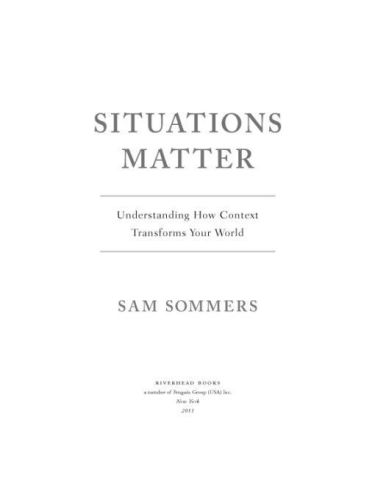
Situations Matter
Understanding How Context Transforms Your World
کتاب های مرتبط
- اطلاعات
- نقد و بررسی
- دیدگاه کاربران
نقد و بررسی

September 19, 2011
With a conversational, laid-back tone and a penchant for storytelling, Tufts University psychology professor Sommers explores the power of context, its ability to “shape our private sense of self, color our notion of the differences between men and women, determine who we love and who we hate.” Most potently, Sommers investigates the notion that “when surrounded by others, we become different people than when we’re on our own.” He finds context responsible for why we feel safer (but more impotent) in crowds, why being reminded of gender stereotypes makes girls do poorly on math tests, and how your apartment building’s floor plan determines how many dates you get. In prose peppered with pop culture anecdotes and stories from his own life, Sommers keeps reader engaged as he unpacks how self-perception affects performance and how mastery of the unspoken norms that govern situations will “alter the way you think about human nature, thereby making you a more effective person...and navigate your social universe more shrewdly.” The book shares its heritage with the bestselling Influence by Robert B. Cialdini. It trots out similar studies and cases, with only a slight twist on Cialdini’s original thesis about power and politics. With its softer approach toward deploying these techniques (referencing awareness more than power) and its personal references, Sommers’s book is the lighter, more pleasurable version.

November 1, 2011
Sommers (Psychology/Tufts Univ.) pokes holes in the comfortable assumption that our actions are driven by character. The author calls attention to how our behavior is influenced by the context of the situations we face, invoking the software term WYSIWYG to describe the way people tend to accept an "oversimplified picture of human nature, clinging as we do to the belief that what you see is what you get." He refers to a 2009 experiment--modeled on Stanley Milgram's much-cited earlier version--to illustrate how ordinary people can be induced to administer torture. Participants were partnered in what they were told was an experiment on the effect of punishment on learning. The job of one was to administer increasingly powerful shocks whenever the other (actually an actor pretending to be shocked) gave a wrong answer. A lab-coated experimenter encouraged the teacher to continue to the end of the protocol, despite agonized screams from the next room begging him to stop. When the setting for the experiment was a university, 65 percent continued to administer increasingly powerful shocks; however, when the so-called experimenter dressed informally, only 20 percent were willing to follow his prompts and continue. Sommers suggests that children are cued to the "ubiquitous societal norms regarding gender," which accounts for much of what we accept as biologically determined gender behavior. An enjoyable guide for would-be free-thinkers on how to recognize social influences that shape behavior.
(COPYRIGHT (2011) KIRKUS REVIEWS/NIELSEN BUSINESS MEDIA, INC. ALL RIGHTS RESERVED.)

November 15, 2011
Just as a frame in an art museum accentuates aspects of the painting it surrounds, so do ordinary situations impact the way people act and think. So posits Sommers (psychology, Tufts Univ.), who won the Saleem Shah Award for Early Career Excellence from the American Psychology-Law Society, as he tries to help readers better understand human behavior and become more effective in relationships with others. He uses familiar sitcom characters, advertising campaigns, and the universal experience of sitting in a traffic jam to explain how expectations and stereotypes affect behavior. He advises readers to look past labels and snap judgments and find what people have in common. Sommers here provides captivating insights into the human psyche.
Copyright 2011 Library Journal, LLC Used with permission.

























دیدگاه کاربران